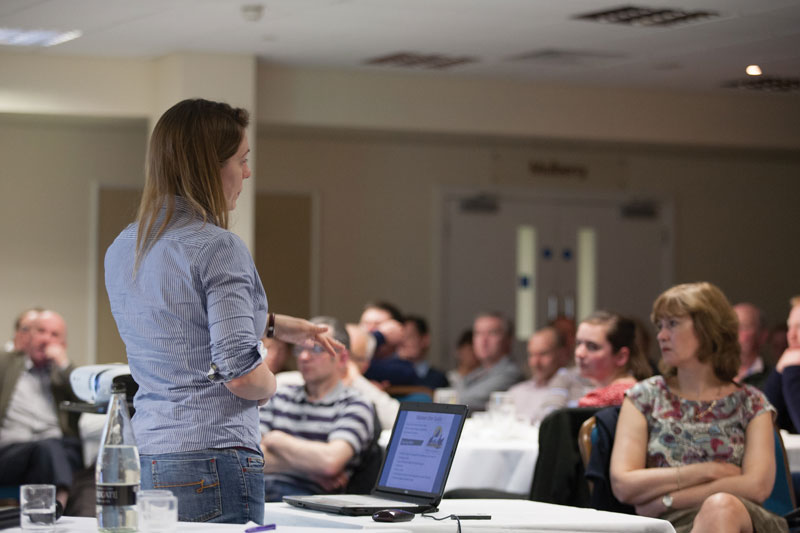
Severe injurious pecking has broken out on another unit involved in the University of Bristol's current beak trimming trials.
Scientists involved in the trials have already suffered one setback with an outbreak of cannibalism in a 16,000-bird trial flock in East Anglia, although Christine Nicol, the professor in charge of the trials, said at the time that there had been no outbreaks in any other flocks. But the Ranger has now learned that a trial flock in Yorkshire has reported serious pecking problems. The mortality rate of the flock has hit 15 per cent.
We asked a member of the Bristol team about the new outbreak during a question and answer session organised by the Yorkshire Egg Producer Discussion Group. Dr Sarah Lambton was speaking to the group about beak trimming work in general at the University of Bristol but she refused to discuss the Yorkshire trial site. Sources have told the Ranger that the trial flock had to undergo emergency beak trimming after injurious pecking pushed the mortality rate amongst the birds up to 15 per cent. The figure is less than the 20 per cent mortality rate in the flock in East Anglia, but still serious enough to raise questions about managing untrimmed birds in a commercial unit.
Egg industry leaders have been calling on politicians to abandon plans for a complete ban on the use of beak trimming, which is currently due to come into force in 2016. The ban was originally due to begin in 2011 but was put off on the advice of the Farm Animal Welfare Council (FAWC) because of the council's concerns about feather pecking and cannibalism. However, the Government is planning a review in 2015, and the intention is that the ban will come into force the following year.
The British Free Range Egg Producers' Association (BFREPA), the British Egg Industry Council (BEIC) and the National Farmers' Union (NFU) have all argued that it is not yet possible to abandon beak trimming without the risk of serious injury to layer flocks from pecking and cannibalism. Members of the British Veterinary Poultry Association have also said the proposed ban in 2016 should be abandoned.
The University of Bristol was commissioned by the Government to run trials to establish ways of managing commercial birds without the use of beak trimming, but the outbreak of cannibalism in a free range trial flock in East Anglia dented such hopes, and the latest news from Yorkshire will provide more evidence to support the view of those in the industry who say it is still too early to think about banning beak trimming.
The Yorkshire unit where the pecking has been reported is a 32,000-bird multi-tier unit divided down the middle with 16,000 birds beak trimmed and 16,000 with their beaks intact. All the birds are being managed in exactly the same way but the pecking has broken out amongst the birds whose beaks have not been trimmed. The Ranger was told that the injurious pecking amongst the birds had resulted in infection - pushing mortality levels above 10 per cent. A vet was called in to beak tip the surviving birds.
During the Yorkshire Egg Producer Discussion Group meeting, Dr Lambton was asked a series of questions about the current state of the beak trimming trials. One producer said, "We know that in the trials you have had some quite severe issues. Have you been able to put that down to anything specific?"
The doctor was very reticent in her response. "I am tied in what I can say," she said. "We can't really say much about what the causal factors might be there, if we ever can, until the end and I suspect I will be in big trouble if I say anything."
Another producer asked her what she would be telling the politicians when the review of a possible beak trimming ban was held in 2015. "I won't tell them anything. My boss; I don't know what she's going to tell them. We haven't finished the study yet."
During her presentation to the discussion group, Dr Lambton said that injurious pecking was a severe problem for free range egg producers. During a study she had conducted she had found that 65 per cent of farmers she spoke to had experienced injurious pecking in their own flocks. She said the estimated cost of injurious pecking to the free range egg industry was £12 million from deaths alone.
The doctor said that studies conducted at Bristol University had shown that adopting certain management techniques could reduce the problem. Researchers had identified 46 'management strategies' that could help on farm and these had been incorporated into the Featherwel guide that the university had produced to help producers minimise injurious pecking. She said the more that these 'management strategies' were adopted the lower were the levels of injurious pecking experienced on production units.
One producer at the meeting said, "Nearly all the points you have made at the presentation I would associate with good stockmanship and early intervention strategies when things are going wrong. If we are trying to cure injurious pecking, does it still happen when the stockmanship is right?"
She said, "That's an almost impossible question to answer. I have seen flocks where there is no injurious pecking." However, she said, "In my own study most of the flocks I looked at were small flocks." She said that some flocks did not suffer from injurious pecking. Whether that was because the producer had adopted all the management strategies suggested by Bristol University, she did not know. "I just don't know the answer to that."
